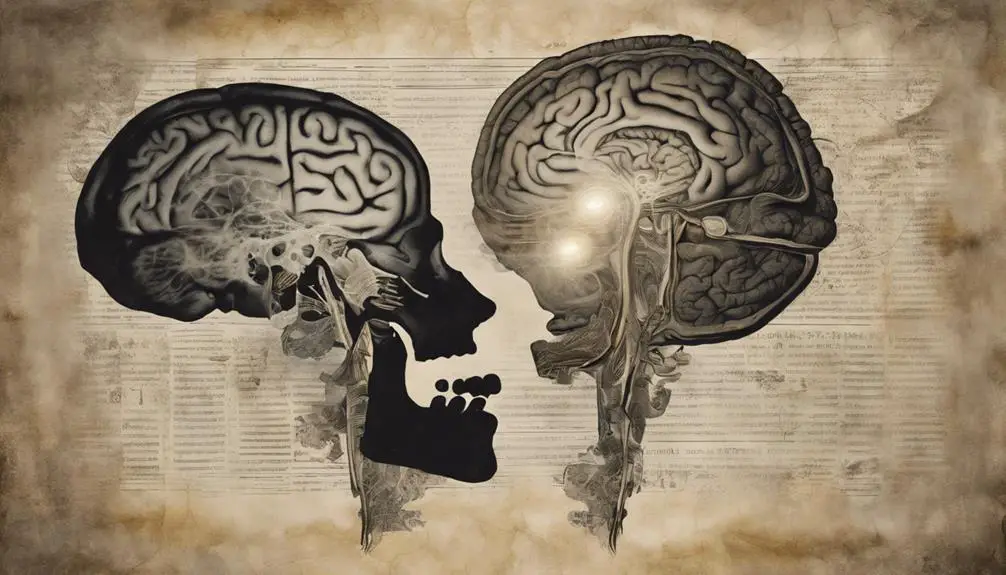A journey into how biblical figures like King Saul may exemplify bipolar disorder, offering a unique perspective on mental health through ancient narratives.

Bipolar Disorder in the Bible
Imagine King Saul, a towering figure of biblical lore, oscillating between profound despair and explosive anger, a scenario that modern professionals might label as symptoms of bipolar disorder. You're entering a realm where ancient texts and contemporary psychology intersect intriguingly.
As you explore further, you'll uncover how figures like Prophet Elijah and King David exhibit emotional extremes that mirror this condition. This journey not only sheds light on the human condition as depicted in sacred texts but also prompts a deeper reflection on how we interpret mental health through the lens of history and faith.
What insights can these ancient stories provide for today's understanding of mental health?
Key Takeaways
- Biblical narratives provide historical perspectives on emotional extremes, mirroring bipolar disorder symptoms.
- Figures like David express a range of emotions in Psalms, hinting at possible mental health insights.
- Stories of resilience and endurance in the Bible offer compassionate views on emotional struggles.
- Cultural interpretations of biblical figures' emotions challenge modern perceptions of mental health.
Understanding Bipolar Disorder

Bipolar disorder, a complex mental health condition, impacts your mood, energy, and activity levels, often leading to significant life challenges. It's crucial you understand both symptom identification and treatment history to navigate this diagnosis effectively. Historically, the approach to bipolar disorder has evolved significantly, reflecting a deeper understanding of its nuances.
Initially, symptom identification was rudimentary, often conflating bipolar disorder with other mental health issues due to a lack of specific diagnostic criteria. You might've found that, decades ago, treatments were blunt, lacking the refinement seen in today's standards. This was largely because the medical community's grasp on the bipolar spectrum wasn't as comprehensive as it's now.
As research progressed, the importance of accurate symptom identification became clear. Recognizing the distinct phases of bipolar disorder—manic, hypomanic, and depressive episodes—allowed for more targeted treatments. This evolution in understanding has significantly improved the quality of life for individuals like yourself, dealing with this condition.
The treatment history of bipolar disorder reveals a journey from near ignorance to a sophisticated array of options. Initially, treatment might've consisted of sedation or even institutionalization without much hope for improvement. Now, you're looking at a tailored approach that can include medication, psychotherapy, lifestyle adjustments, and support systems—all aimed at managing symptoms and improving overall well-being.
Understanding this history is essential. It not only shows how far we've come in managing bipolar disorder but also highlights the importance of continual learning and adaptation in treatment approaches. As you navigate your journey with bipolar disorder, remember, you're benefiting from centuries of medical advancement and a deeper understanding of mental health.
Biblical Figures and Emotional Extremes

Having explored the evolution of understanding and treatment of bipolar disorder, we now turn our attention to biblical figures who exhibited emotional extremes, shedding light on historical perceptions of mental health. The Bible, a rich source of human stories, offers insights into how emotional extremes were perceived and narrated in ancient times, providing a backdrop against which to consider modern understandings of conditions like bipolar disorder.
Consider Job, a man whose faith was tested through extreme suffering and loss. Job's sufferings, including the loss of his family, wealth, and health, plunged him into deep despair. Yet, his story also highlights a journey through these emotional depths to a place of restoration and faith. Job's experiences mirror the emotional rollercoaster often associated with bipolar disorder, where individuals swing from the depths of depression to heights of well-being, albeit in a spiritual and material sense in Job's case.
Noah's resilience, on the other hand, showcases a different aspect of emotional extremes. Tasked with building an ark to survive a world-destroying flood, Noah's steadfastness in the face of an unimaginable task reflects an enduring optimism and strength. While not a direct parallel, Noah's ability to maintain hope and continue his monumental task under divine command can be seen as emblematic of the resilience required to manage the highs and lows of bipolar disorder.
These stories, while not clinical diagnoses, illuminate the human experience of emotional extremes and resilience, offering a compassionate lens through which to view the struggles of those with bipolar disorder today. They remind us that the journey through emotional extremes has deep historical roots, enriching our understanding of mental health across the ages.
King Saul's Turbulent Reign

King Saul's reign, marked by profound emotional swings and erratic decisions, offers a compelling study of the complexities surrounding mental health in a biblical context. You might find yourself intrigued by how his story intertwines with themes of Saul's jealousy and royal instability, shedding light on the ancient understanding of psychological disturbances.
Delving into Saul's narrative, you'll notice that his jealousy towards David isn't just a fleeting sentiment but a powerful force driving many of his actions. This envy, stemming from David's military successes and popularity, leads Saul down a path of erratic behavior and decision-making. It's fascinating to observe how these emotional extremes contribute to a sense of royal instability, casting a shadow over Saul's ability to lead effectively.
Moreover, Saul's bouts of depression and aggression, as depicted in biblical texts, suggest a struggle with internal turmoil. You're drawn into considering how these episodes reflect the early recognition of mental health issues, despite the lack of contemporary terminology or understanding.
The analysis of Saul's reign through a mental health lens allows you to appreciate the nuanced portrayal of his character in the Bible. It's a reminder of the timeless nature of human emotions and the impact they've on individuals' lives, regardless of their status or era.
As you reflect on Saul's story, it becomes clear that his experiences with jealousy and instability offer valuable insights into the complexities of mental health. It's a thought-provoking perspective that enriches your understanding of biblical narratives and their relevance to contemporary discussions on psychological well-being.
Prophet Elijah's Descent and Ascent

In the biblical narrative, Prophet Elijah's emotional journey from despair to rejuvenation offers a profound exploration of mental resilience and divine intervention. You observe a man who, despite his unwavering faith and monumental achievements, succumbs to the depths of fear and despondency. This descent begins after Elijah's climactic triumph over the prophets of Baal on Mount Carmel, an event that marks a high point in his prophetic journey. Yet, the subsequent threat to his life by Queen Jezebel sends him fleeing into the wilderness, where he prays for death, showcasing a starkly human side of this spiritual giant.
Elijah's resilience, however, becomes evident as you follow his journey into solitude. It's in this moment of utter vulnerability that divine intervention is most palpable. Rather than a grandiose display of power, God reaches out to Elijah through a gentle whisper, demonstrating that divine care often manifests in subtlety. This encounter not only revives Elijah's spirit but also realigns his focus towards the tasks at hand, including the anointing of his successor, Elisha.
You're reminded that Elijah's prophetic journey is as much about his internal struggles as it's about his external achievements. His ascent from despair back to purpose underscores a pivotal message: resilience is often forged in the quiet moments of introspection and reaffirmed through divine encouragement. Elijah's story, thus, serves as a beacon of hope, illustrating that even the mightiest among us can falter and recover, often emerging stronger through the grace of perseverance and faith.
David's Psalms of Lament and Joy

As we explore another facet of emotional expression in the Bible, consider the profound depth of David's Psalms, where he articulates his moments of lament and joy with remarkable honesty and vulnerability. These texts serve not only as a form of artistic expression but also allow for a psychological analysis of David's state of mind. The oscillation between profound despair and exuberant joy in his writings offers a unique window into his psyche, possibly reflecting the emotional volatility associated with bipolar disorder.
You'll notice how David's Psalms of Lament, such as Psalm 22, where he cries out, 'My God, my God, why have you forsaken me?' contrast sharply with his Psalms of Joy, like Psalm 23, which begins with 'The Lord is my shepherd, I'll not want.' This stark contrast highlights a complex emotional landscape, where intense sorrow lives alongside profound peace and happiness.
Through a closer examination, it's evident that David's emotional expression transcends mere mood swings; it's a raw and unfiltered depiction of human emotion in its purest form. His ability to channel these feelings into artful poetry hasn't only provided solace to many over the centuries but also presents a case study for psychological analysis today.
Modern Interpretations and Debates

Numerous scholars and theologians have engaged in spirited debates over the modern interpretation of emotional expressions found in biblical figures like David, suggesting a broader understanding of their psychological depth. You're now diving into a conversation that's not only about historical accuracy but also challenges our cultural perceptions of mental health.
The debates revolve around several key points:
- Historical Accuracy vs. Contemporary Diagnosis: Scholars question the feasibility of diagnosing historical figures with modern psychological terms. They argue that while the behaviors and emotions described might resemble symptoms of bipolar disorder, it's critical to consider the historical and cultural context in which these texts were written.
- Cultural Perceptions of Mental Health: The discussion extends into how mental health conditions were perceived in biblical times versus today. Cultural perceptions have shifted significantly, and what we now recognize as symptoms of a mental health condition might've been interpreted very differently in the past.
- Theological Implications: There's a careful line to tread between respecting the theological significance of biblical figures and exploring their human complexity. Scholars emphasize the importance of not reducing these figures to their possible mental health conditions but rather understanding these conditions within the broader narrative of their lives and contributions.
This debate isn't just academic; it's a reflection of how society grapples with the complexities of mental health, historical interpretation, and cultural sensitivity. By engaging in this conversation, you're contributing to a more nuanced understanding of both the past and present perceptions of mental health.
Frequently Asked Questions
How Does the Concept of Spiritual Possession or Divine Punishment in the Bible Intersect With Modern Interpretations of Mental Health Conditions Like Bipolar Disorder?
You're navigating a complex intersection where ancient narratives of spiritual possession or divine punishment meet modern understandings of mental health, like bipolar disorder.
This comparison highlights how divine emotions and spiritual resilience were historically perceived as external influences, contrasting with today's view of these conditions as internal, medical issues.
Analyzing these perspectives informs a respectful dialogue, enriching both spiritual and psychological discourses by acknowledging the depth of human experience across time.
Are There Any Biblical Dietary or Lifestyle Recommendations That Might Align With Contemporary Advice for Managing Bipolar Disorder Symptoms?
You're exploring how dietary laws and prayerful meditation align with modern advice for managing bipolar disorder symptoms. Analyzing these aspects, you find that certain biblical recommendations, like eating clean foods and engaging in regular prayerful meditation, mirror contemporary lifestyle advice for mental wellness.
This holistic approach emphasizes the importance of a balanced diet and mental tranquility, offering a respectful and informed perspective on integrating ancient wisdom with modern health practices.
How Have Religious Communities Historically Responded to Individuals Displaying Symptoms Similar to Bipolar Disorder, and How Has This Changed Over Time?
Imagine living in a time when your mood swings could lead you to be labeled a witch. Historically, religious communities often misunderstood bipolar-like symptoms, sometimes attributing them to witchcraft, especially during medieval times. Medieval treatments were harsh and misguided.
However, as understanding evolved, so did responses. Today, many religious groups offer more compassionate support, recognizing these symptoms as part of a medical condition, reflecting a significant shift from fear to empathy.
In What Ways Do Contemporary Religious Leaders and Theologians Discuss or Provide Guidance on the Intersection of Faith, Prayer, and the Treatment of Bipolar Disorder?
Today, you'll find that contemporary religious leaders and theologians explore the nexus of faith, prayer, and bipolar disorder treatment through varied lenses.
There's a lively debate around faith healing, with opinions diverging significantly. Scripture interpretation also plays a crucial role, influencing how guidance is offered to those affected.
These discussions reflect a broader understanding of mental health, emphasizing respectful, informed dialogue that bridges spiritual beliefs and medical perspectives.
What Are the Ethical Considerations in Diagnosing Historical or Biblical Figures With Modern Psychiatric Conditions, and How Does This Impact Our Understanding of Mental Health in a Religious Context?
You might wonder, is it fair to diagnose historical figures with modern conditions?
Well, diving into the ethical implications of historical diagnosis reveals a complex landscape.
It's crucial to approach with respect and understanding, acknowledging the differences in time periods and knowledge.
This method impacts our grasp of mental health in any religious context by challenging us to consider the nuances of interpreting behaviors and experiences through a contemporary lens.
Conclusion
Navigating the tempestuous waters of bipolar disorder through the lens of biblical narratives offers a unique perspective on enduring human struggles. Figures like Saul, Elijah, and David showcase the spectrum of human emotion, from the depths of despair to the peaks of jubilation.
This journey underscores the timeless nature of mental health challenges, inviting a modern dialogue that bridges ancient wisdom with contemporary understanding. It's a testament to the resilience woven into the human spirit, guiding us through life's tumultuous seas.



Sign up